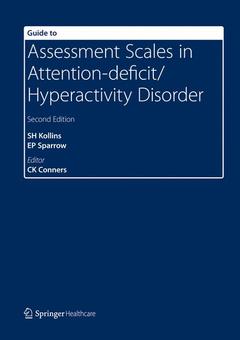Description
Guide to Assessment Scales in Attention-Deficit/Hyperactivity Disorder (2nd Ed., 2nd ed. 2010)
Second Edition
Authors: Kollins Scott H, Sparrow Elizabeth, Conners C Keith
Language: English
Subjects for Guide to Assessment Scales in...:
Approximative price 52.74 €
In Print (Delivery period: 15 days).
Add to cart55 p. · 21x14.8 cm · Paperback
Description
/li>Contents
/li>Biography
/li>
A comprehensive guide to the assessment scales, interviews, and questionnaires for ADHD for children, adolescence, and adults.
Written by world-renowned experts in psychiatry, specifically in ADHD. Dr Conners? work in this book is invaluable as he is the author of the most widely used assessment scales in the field.
A follow-up of the 2003 first edition of the Guide to Assessment Scales in Attention-Deficit Hyperactivity Disorder (also written by Dr Conners and Dr Kollins)
Concise analysis of the most useful and popular scales assessing ADHD for children, adolescents, and adults.
Explains how to most effectively use the top assessment scales in ADHD for children and adults in the context of a clinical practice
Expert commentaries highlight the advantages and disadvantages of each scale, in addition to providing a discussion on how and when to administer them.
Attention-deficit hyperactivity disorder (ADHD) is the most commonly studied and diagnosed psychiatric disorder in children, affecting about 3?5% of children globally and diagnosed in about 2?16% of school aged children. Additionally, it is a chronic disorder; 30?50% of individuals diagnosed with ADHD in childhood continue to be symptomatic in adulthood. However, with early diagnosis, medical management and behavioral treatment has been most effective when treating patients with ADHD at any age.
Assessment scales are critical and essential tools for the diagnosis and treatment of patients with ADHD. This book has been designed to provide clinicians with a quick guide to the most effective assessment scales in ADHD for patients at any age. Additionally, the scales are used in clinical trials to evaluate drug efficacy.
Authors
Scott H. Kollins, PhD, is an Associate Professor in the Department of Psychiatry at Duke University Medical Center, North Carolina. He completed his undergraduate degree at Duke University, and earned his doctorate in clinical psychology from Auburn University. His primary research areas of expertise pertain to the psychopharmacology of stimulant drugs used to treat attention-deficit/hyperactivity disorder (ADHD) and the comorbidity of nicotine dependence and ADHD. He is an elected member of both the College on Problems of Drug Dependence and the American College of Neuropsychopharmacology. He has published more than 70 peer-reviewed scientific papers and his research has been consistently funded for over 10 years by federal and industry sources. He has 15 years of clinical experience working with ADHD individuals and their families. The ADHD Program at Duke University, which Dr Kollins directs, serves more than 150 families annually from across the US and the world.
Elizabeth P. Sparrow, PhD, is a clinical neuropsychologist in private practice in Raleigh, North Carolina. She received her doctorate in clinical psychology from Washington University in St. Louis, Missouri, with a clinical internship in neuropsychology at the University of Chicago and post-doctoral residency in pediatric neuropsychology at the Kennedy Krieger Institute and Johns Hopkins University School of Medicine. Prior to pursuing her doctorate, Dr Sparrow worked with Dr Conners in his ADHD Clinic at Duke University Medical Center. In addition to private practice, Dr Sparrow has served as a consultant to test publishers to improve assessment tools for ADHD. She has also provided consultation to the pharmaceutical industry to improve research on new compounds for ADHD, including measure selection and rater training in adult and pediatric ADHD clinical trials. Dr Sparrow has presented on ADHD and related disorders at national and international conferences, as well as
These books may interest you

ADHD Rating Scale—5 for Children and AdolescentsChecklists, Norms, and Clinical Interpretation 200.18 €

ADHD, Stress, and Development 63.29 €


